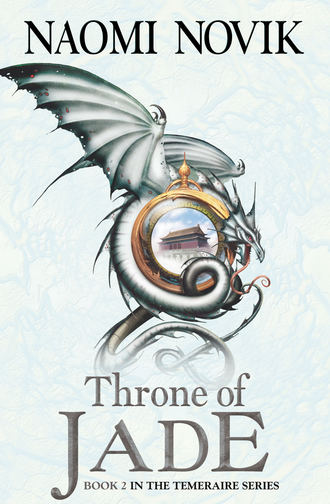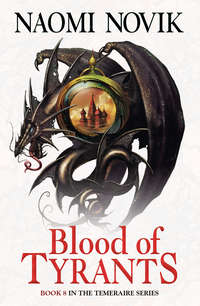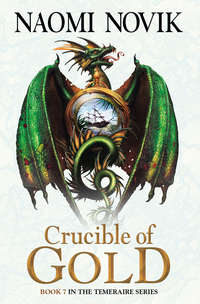
Полная версия
Throne of Jade
‘It is very nice; I am more comfortable even than in my clearing.’ Temeraire approved: from his place of solitary glory, he could see all the ship’s activity without being in the way, and the ship’s galley with its ovens was placed directly beneath the dragondeck, which kept the surface warm. ‘You are not cold at all, Laurence?’ he asked, for perhaps the third time, craning his head down to peer closely at him.
‘No, not in the least,’ Laurence said shortly; he was a little annoyed by the continuing oversolicitude. Though the dizziness and headache had subsided together with the lump upon his head, his bruised leg remained stubborn, prone to giving out at odd moments and throbbing with an almost constant ache. He had been hoisted aboard in a bo’sun’s chair, very offensive to his sense of his own capabilities, then put directly into an elbow-chair and carried up to the dragondeck, swathed in blankets like an invalid, and now had Temeraire very carefully coiling himself about to serve as a windbreak.
There were two sets of stairs rising to the dragondeck, one on either side of the foremast, and the area of the forecastle stretching from the foot of these and halfway to the mainmast was by custom allocated to the aviators, while the foremast jacks ruled the remainder of the space up to the mainmast. Already Temeraire’s crew had taken possession of their rightful domain, pointedly pushing several piles of coiled cables across the invisible dividing line; bundles of leather harness and baskets full of rings and buckles had been laid down in their place, all to put the Navy men on notice that the aviators were not to be taken advantage of. Those men not occupied in putting away their gear were ranged along the line in various attitudes of relaxation and affected labour; Roland and the other two cadet runners, Morgan and Dyer, had been set to playing there by the ensigns, who had conveyed their duty to defend the rights of the Corps. Being so small they could walk the ship’s rail with ease and were dashing back and forth with a fine show of recklessness.
Laurence watched them, broodingly; he was still uneasy about bringing Roland. ‘Why would you leave her? Has she been misbehaving?’ was all Jane had asked, when he had consulted her on the matter; impossibly awkward to try and explain his concerns, facing her. And of course, there was some sense in taking the girl along, young as she was: she would have to face every demand made of a male officer, when she came to be Excidium’s captain on her mother’s retirement; it would be no kindness to leave her unprepared by being too soft on her now.
Even so, now that he was aboard he was sorry. This was not a covert, and he had already seen that as with any naval crew there were some ugly, some very ugly fellows among the lot: drunkards, brawlers, gaol-birds. He felt too heavily the responsibility of watching over a young girl among such men; not to mention that he would be best pleased if the secret that women served in the Corps did not come out here and make a noise.
He did not mean to instruct Roland to lie, by no means, and of course he could not give her different duties than otherwise; but he privately and intensely hoped the truth might remain concealed. Roland was only eleven, and no cursory glance would take her for a girl in her trousers and short jacket; he had once mistaken her for a boy himself. But he also desired to see the aviators and the sailors friendly, or at least not hostile, and a close acquaintance could hardly fail to notice Roland’s real gender for long.
At present his hopes looked more likely to be answered in her case than the general. The foremast hands, engaged in the business of loading the ship, were talking none too quietly about fellows who had nothing better to do but sit about and be passengers; a couple of men made loud comments about how the shifted cables had been cast all ahoo, and set to recoiling them, unnecessarily. Laurence shook his head and kept his silence; his own men had been within their rights, and he could not reprove Riley’s men, nor would it do any good.
However, Temeraire had noticed also; he snorted, his ruff coming up a little. ‘That cable looks perfectly well to me,’ he said. ‘My crew were very careful moving it.’
‘It is all right, my dear; can never hurt to recoil a cable,’ Laurence said hurriedly. It was not very surprising that Temeraire had begun to extend his protective and possessive instincts over the crew as well; they had been with him now for several months. But the timing was wretchedly inconvenient: the sailors would likely be nervous to begin with at the presence of a dragon, and if Temeraire involved himself in any dispute, taking the part of his crew, that could only increase the tensions on board.
‘Pray take no offence,’ Laurence added, stroking Temeraire’s flank to draw his attention. ‘The beginning of a journey is so very important; we wish to be good shipmates, and not encourage any sort of rivalry among the men.’
‘Hm, I suppose,’ Temeraire said, subsiding. ‘But we have done nothing wrong; it is disagreeable of them to complain so.’
‘We will be underway soon,’ Laurence said, by way of distraction. ‘The tide has turned, and I think that is the last of the embassy’s luggage coming aboard now.’
Allegiance could carry as many as ten mid-weight dragons, in a pinch; Temeraire alone scarcely weighed her down, and there was a truly astonishing amount of storage space aboard. Yet the sheer quantity of the baggage the embassy carried began to look as though it would strain even her great capacity: shocking to Laurence, used to travelling with little more than a single sea-chest, and seeming quite out of proportion to the size of the entourage, which was itself enormous.
There were some fifteen soldiers, and no less than three physicians: one for the prince himself, one for the other two envoys, and one for the remainder of the embassy, each with assistants. After these and the translator, there were besides a pair of cooks with assistants, perhaps a dozen body servants, and an equal number of other men who seemed to have no clear function at all, including one gentleman who had been introduced as a poet, although Laurence could not believe this had been an accurate translation: more likely the man was a clerk of some sort.
The prince’s wardrobe alone required some twenty chests, each one elaborately carved and with golden locks and hinges: the bo’sun’s whip flew loud and cracking more than once, as the more enterprising sailors tried to pry them off. The innumerable bags of food had also to be slung aboard, and having already come once from China, they were beginning to show wear. One enormous eighty-pound sack of rice split wide open as it was handed across the deck, to the universal joy and delectation of the hovering seagulls, and afterwards the sailors were forced to wave the frenzied clouds of birds away every few minutes as they tried to keep on with their work.
There had already been a great fuss about boarding, earlier. Yongxing’s attendants had demanded, at first, a walkway leading down to the ship – wholly impossible, even if the Allegiance could have been brought close enough to the dock to make a walkway of any sort practical, because of the height of her decks. Poor Hammond had spent the better part of an hour trying to persuade them that there was no dishonour or danger either in being lifted up to the deck, and pointing at frustrated intervals at the ship herself, a mute argument.
Hammond had eventually said to him, quite desperately, ‘Captain, is this a dangerously high sea?’ An absurd question, with a swell less than five feet, though in the brisk wind the waiting barge had occasionally bucked against the ropes holding her to the dock, but even Laurence’s surprised negative had not satisfied the attendants. It had seemed they might never get aboard, but at last Yongxing himself had grown tired of waiting and ended the argument by emerging from his heavily-draped sedan chair, and climbing down into the boat, ignoring both the flurry of his anxious attendants and the hastily offered hands of the barge’s crew.
The Chinese passengers who had waited for the second barge were still coming aboard now, on the starboard side, to the stiff and polished welcome of a dozen Marines and the most respectable-looking of the sailors, interleaved in a row along the inner edge of the gangway, decorative in their bright red coats and the white trousers and short blue jackets of the sailors.
Sun Kai, the younger envoy, leapt easily down from the bo’sun’s chair and stood a moment looking around the busy deck thoughtfully. Laurence wondered if perhaps he did not approve the clamour and disarray of the deck, but no, it seemed he was only trying to get his feet underneath him: he took a few tentative steps back and forth, then stretched his sea-legs a little further and walked the length of the gangway and back more surely, with his hands clasped behind his back, and gazed with frowning concentration up at the rigging, trying evidently to trace the maze of ropes from their source to their conclusion.
This was much to the satisfaction of the men on display, who could at last stare their own fill in return. Prince Yongxing had disappointed them all by vanishing almost at once to the private quarters which had been arranged for him at the stern; Sun Kai, tall and properly impassive with his long black queue and shaved forehead, in splendid blue robes picked out with red and orange embroidery, was very nearly as good, and he showed no inclination to seek out his own quarters.
A moment later they had a still better piece of entertainment; shouts and cries rose from below, and Sun Kai sprang to the side to look over. Laurence sat up, and saw Hammond running to the edge, pale with horror: there had been a noisy splashing. But a few moments later, the older envoy finally appeared over the side, dripping water from the sodden lower half of his robes. Despite his misadventure, the grey-bearded man climbed down with a roar of good-humoured laughter at his own expense, waving off what looked like Hammond’s urgent apologies; he slapped his ample belly with a rueful expression, and then went away in company with Sun Kai.
‘He had a narrow escape,’ Laurence observed, sinking back into his chair. ‘Those robes would have dragged him down in a moment, if he had properly fallen in.’
‘I am sorry they did not all fall in,’ Temeraire muttered, quietly for a twenty-ton dragon; which was to say, not very. There were sniggers on the deck, and Hammond glanced over at them anxiously.
The rest of the retinue were gotten aboard without further incident, and stowed away almost as quickly as their baggage. Hammond looked much relieved when the operation was at last completed, blotting his sweating forehead on the back of his hand, though the wind was knife-cold and bitter, and sat down quite limply on a locker along the gangway, much to the annoyance of the crew. They could not get the barge back aboard with him in the way, and yet he was a passenger and an envoy himself, too important to be bluntly told to move.
Taking pity on them all, Laurence looked for his runners: Roland, Morgan, and Dyer had been told to stay quiet on the dragondeck and out of the way, and so were sitting in a row at the very edge, dangling their heels into space. ‘Morgan,’ Laurence said, and the dark-haired boy scrambled up and towards him, ‘go and invite Mr. Hammond to come and sit with me, if he would like.’
Hammond brightened at the invitation and came up to the dragondeck at once; he did not even notice as behind him the men immediately began rigging the tackles to hoist aboard the barge. ‘Thank you, sir, thank you, it is very good of you,’ he said, taking a seat on a locker which Morgan and Roland together pushed over for him, and accepting with still more gratitude the offer of a glass of brandy. ‘How I should have managed, if Liu Bao had drowned, I have not the least notion.’
‘Is that the gentleman’s name?’ Laurence said; all he remembered of the older envoy from the Admiralty meeting was his rather whistling snore. ‘It would have been an inauspicious start to the journey, but Yongxing could scarcely have blamed you for his taking a misstep.’
‘No, there you are quite wrong,’ Hammond said. ‘He is a prince; he can blame anyone he likes.’
Laurence was disposed to take this as a joke, but Hammond seemed rather glumly serious about it; and after drinking the best part of his glass of brandy in what already seemed to Laurence, despite their brief acquaintance, an uncharacteristic silence, Hammond added abruptly, ‘And pray forgive me – I must mention, how very prejudicial such remarks may be – the consequences of a moment’s thoughtless offence—’
It took Laurence a moment to puzzle out that Hammond referred to Temeraire’s earlier resentful mutterings; Temeraire was quicker and answered for himself. ‘I do not care if they do not like me,’ he said. ‘Maybe then they will let me alone, and I will not have to stay in China.’ This thought visibly struck him, and his head came up with sudden enthusiasm. ‘If I were very offensive, do you suppose they would go away now?’ he asked. ‘Laurence, what would be particularly insulting?’
Hammond looked like Pandora, the box open and horrors loosed upon the world; Laurence was inclined to laugh, but he stifled it out of sympathy. Hammond was young for his work, and surely, however brilliant his talents, felt his own lack of experience; it could not help but make him overcautious.
‘No, my dear, it will not do,’ Laurence said. ‘Likely they would only blame us for teaching you ill-manners, and resolve all the more on keeping you.’
‘Oh.’ Temeraire disconsolately let his head sink back down onto his forelegs. ‘Well, I suppose I do not mind so much going, except that everyone else will be fighting without me,’ he said in resignation. ‘But the journey will be very interesting, and I suppose I would like to see China; only they will try to take Laurence away from me again, I am sure, and I am not going to have any of it.’
Hammond prudently did not engage him on this subject, but hurried instead to say, ‘How long this business of loading has all taken – surely it is not typical? I made sure we would be halfway down the Channel by noon; here we have not yet even made sail.’
‘I think they are nearly done,’ Laurence said; the last immense chest was being swung aboard into the hands of the waiting sailors with the help of a block and line. The men all looked tired and surly, as well they might, having spent the time it would take to load ten dragons, loading only one man and his accoutrements; and their dinner was a good half-hour overdue already.
As the chest vanished below, Captain Riley climbed the stairs from the quarterdeck to join them, taking his hat off long enough to wipe sweat away from his brow. ‘I have no notion how they got themselves and the lot to England. I suppose they did not come by transport?’
‘No, or else we would surely be returning by their ship,’ Laurence said. He had not considered the question before and realized only now that he had no idea how the Chinese embassy had made their voyage. ‘Perhaps they came overland.’ Hammond was silent and frowning, evidently wondering himself.
‘That must be a very interesting journey, with so many different places to visit,’ Temeraire observed. ‘Not that I am sorry to be going by sea: not at all,’ he added, hastily, peering down anxiously at Riley to be sure he had not offended. ‘Will it be much faster, going by sea?’
‘No, not in the least,’ Laurence said. ‘I have heard of a courier going from London to Bombay in two months, and we will be lucky to reach Canton in seven. But there is no secure route by land: France is in the way, unfortunately, and there is a great deal of banditry, not to mention the mountains and the Taklamakan desert to cross.’
‘I would not wager on less than eight months, myself,’ Riley said. ‘If we make six knots with the wind anywhere but dead astern, it will be more than I look for, judging by her log.’ Below and above now there was a great scurry of activity, all hands preparing to unmoor and make sail; the ebbing tide was lapping softly against the windward side. ‘Well, we must get about it. Laurence, tonight I must be on deck, I need to take the measure of her; but I hope you will dine with me tomorrow? And you also, of course, Mr. Hammond.’
‘Captain,’ Hammond said, ‘I am not familiar with the ordinary course of a ship’s life – I beg your indulgence. Would it be suitable to invite the members of the embassy?’
‘Why—’ Riley said, astonished, and Laurence could not blame him; it was a bit much to be inviting people to another man’s table. But Riley caught himself, and then said, more politely, ‘Surely, sir, it is for Prince Yongxing to issue such an invitation first.’
‘We will be in Canton before that happens, in the present state of relations,’ Hammond said. ‘No; we must make shifts to engage them, somehow.’
Riley offered a little more resistance; but Hammond had taken the bit between his teeth and managed, by a skilful combination of coaxing and deafness to hints, to carry his point. Riley might have struggled longer, but the men were all waiting impatiently for the word to weigh anchor, the tide was going every minute, and at last Hammond ended by saying, ‘Thank you, sir, for your indulgence; and now I will beg you gentlemen to excuse me. I am a fair enough hand at their script on land, but I imagine it will take me some more time to draft an acceptable invitation aboard ship.’ With this, he rose and escaped before Riley could retract the surrender he had not quite made.
‘Well,’ Riley said, gloomily, ‘before he manages it, I am going to go and get us as far out to sea as I can; if they are mad as fire at my cheek, at least with this wind I can say in perfect honesty that I cannot get back into port for them to kick me ashore. By the time we reach Madeira they may get over it.’
He jumped down to the forecastle and gave the word; in a moment the men at the great quadruple-height capstans were straining, their grunting and bellowing carrying up from the lower decks as the cable came dragging over the iron catheads: the Allegiance’s smallest kedge anchor as large as the best bower of another ship, its flukes spread wider than the height of a man.
Much to the relief of the men, Riley did not order them to warp her out; a handful of men pushed off from the pilings with iron poles, and even that was scarcely necessary: the wind was from the northwest, full on her starboard beam, and that with the tide carried her now easily away from the harbour. She was only under topsails, but as soon as they had cleared moorings Riley called for topgallants and courses, and despite his pessimistic words they were soon going through the water at a respectable clip: she did not make much leeway, with that long deep keel, but went straight down the Channel in a stately manner.
Temeraire had turned his head forward to enjoy the wind of their progress: he looked rather like the figurehead of some old Viking ship. Laurence smiled at the notion. Temeraire saw his expression and nudged at him affectionately. ‘Will you read to me?’ he asked hopefully. ‘We will have only another couple of hours of light.’
‘With pleasure,’ said Laurence, and sat up to look for one of his runners. ‘Morgan,’ he called, ‘will you be so good as to go below and fetch me the book in the top of my sea-chest, by Gibbon; we are in the second volume.’
The great admiral’s cabin at the stern had been hastily converted into something of a state apartment for Prince Yongxing, and the captain’s cabin beneath the poop deck divided for the other two senior envoys, the smaller quarters nearby given over to the crowd of guards and attendants, displacing not only Riley himself, but the ship’s first lieutenant, Lord Purbeck, the surgeon, the master, and several other of his officers. Fortunately, the quarters at the fore of the ship, ordinarily reserved for the senior aviators aboard, were all but empty with Temeraire the only dragon aboard: even shared out among them all, there was no shortage of room; and for the occasion, the ship’s carpenters had knocked down the bulkheads of their individual cabins and made a grand dining space.
Too grand, at first: Hammond had objected. ‘We cannot seem to have more room than the prince,’ he explained, and so had the bulkheads shifted a good six feet forward: the collected tables were suddenly cramped.
Riley had benefited from the enormous prize-money awarded for the capture of Temeraire’s egg almost as much as Laurence himself had; fortunately he could afford to keep a good table and a large one. The occasion indeed called for every stick of furniture which could be found on board: the instant he had recovered from the appalling shock of having his invitation even partly accepted, Riley had invited all the senior members of the gunroom, Laurence’s own lieutenants, and any other man who might reasonably be expected to make civilized conversation.
‘But Prince Yongxing is not coming,’ Hammond said, ‘and the rest of them have less than a dozen words of English between them. Except for the translator, and he is only one man.’
‘Then at least we can make enough noise amongst ourselves we will not all be sitting in grim silence,’ Riley said.
But this hope was not answered: the moment the guests arrived, a paralysed silence descended, bidding fair to continue throughout the meal. Though the translator had accompanied them, none of the Chinese spoke at first. The older envoy Liu Bao had stayed away also, leaving Sun Kai as the senior representative; but even he made only a spare, formal greeting on their arrival, and afterwards maintained a calm and silent dignity, though he stared intently at the barrel-thick column of the foremast, painted in yellow stripes, which came down through the ceiling and passed directly through the middle of the table, and went so far as to look beneath the table-cloth, to see it continuing down through the deck below.
Riley had left the right side of the table entirely for the Chinese guests, and had them shown to places there, but they did not move to sit when he and the officers did, which left the British in confusion, some men already half-seated and trying to keep themselves suspended in mid-air. Bewildered, Riley pressed them to take their seats; but he had to urge them several times before at last they would sit. It was an inauspicious beginning, and did not encourage conversation.
The officers at first began by taking refuge in their dinners, but even that semblance of good manners did not last very long. The Chinese did not eat with knife and fork, but with lacquered sticks they had brought with them. These they somehow manoeuvred one-handed to bring food to their lips, and shortly the British half of the company were staring in helplessly rude fascination, every new dish presenting a fresh opportunity to observe the technique. The guests were briefly puzzled by the platter of roast mutton, large slices carved from the leg, but after a moment one of the younger attendants carefully proceeded to roll up a slice, still only using the sticks, and picked it up entire to eat in three bites, leading the way for the rest.
By now Tripp, Riley’s youngest midshipman, a plump and unlovely twelve-year-old aboard by virtue of his family’s three votes in Parliament, and invited for his own education rather than his company, was surreptitiously trying to imitate the style, using his fork and knife turned upside-down in place of the sticks, his efforts meeting without notable success, except in doing damage to his formerly-clean breeches. He was too far down the table to be quelled by hard looks, and the men around him were too busy gawking themselves to notice.
Sun Kai had the seat of honour nearest Riley, and desperate to keep his attention from the boy’s antics, Riley tentatively raised a glass to him, watching Hammond out of the corner of his eye for direction, and said, ‘To your health, sir.’ Hammond murmured a hasty translation across the table, and Sun Kai nodded, raised his own glass, and sipped politely, though not very much: it was a heady Madeira well-fortified with brandy, chosen to survive rough seas. For a moment it seemed this might rescue the occasion: the rest of the officers were belatedly recalled to their duty as gentlemen, and began to salute the rest of the guests; the pantomime of raised glasses was perfectly comprehensible without any translation, and led naturally to a thawing of relations. Smiles and nods began to traverse the table, and Laurence heard Hammond, beside him, heave out an almost inaudible sigh through open lips, and finally take some little food.









